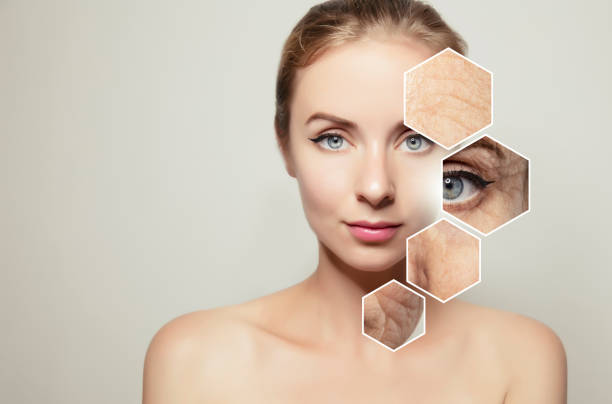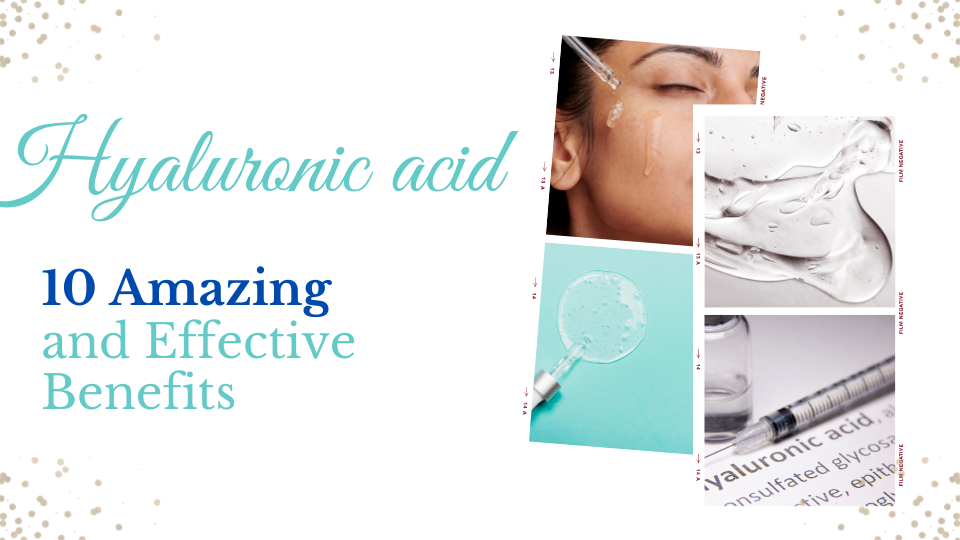Have you already tried with hyaluronic acid? If you haven’t already, now is the time to begin. It is the most effective anti-aging component that human has yet discovered. The only thing that is preferable than being young is appearing to be youthful and glowing skin.
Hyaluronic acid is one of the most commonly encountered moisturizers that can be found in topical skin care products. It does this by luring water to the surface of the skin, which in turn causes the skin to appear more hydrated, plump, and smooth.
Table of Contents
What is hyaluronic acid?

Hyaluronic acid, which is sometimes referred to as hyaluronan, is a chemical that is created naturally by your body and has a transparent, sticky consistency.
The highest concentrations of it are discovered in the connective tissue, eyes, and skin of the body.
The primary purpose of it is to store water, which helps to keep the tissues in your body lubricated and moist.
There are several applications for hyaluronic acid. It is most commonly consumed in the form of a dietary supplement; however, it can also be found in injectable forms, ocular drops, and topical serums. Hyaluronic acid is an important component in maintaining the skin’s moisture balance. Because people’s skin loses moisture as they get older, some of them decide to take hyaluronic acid supplements in order to make up for the loss.
Oral supplements, topical creams, serums, or even injections are all potential delivery methods for this type of treatment.
This article details ten benefits of using hyaluronic acid for the face and body that are supported by scientific research. It highlights the benefits and the potential adverse effects that can occur from using it.
Benefits of hyaluronic acid for skin
Hydration and the incredible capacity of hyaluronic acid to hold onto moisture is the primary advantage of using this substance. Dehydrated skin, which occurs when the uppermost layer of skin does not have enough water, appears dry, rough, and flaky. This is the first thing you need to know in order to comprehend how vitally crucial moisture is for the skin.
It contributes to the smooth functioning of things.
Hyaluronic acid contributes to the smooth and efficient functioning of your joints. It protects the patient from experiencing discomfort and harm that can be caused by the bones grinding against each other.
It helps to maintain the proper level of hydration.
Hyaluronic acid has an excellent capacity for holding onto water. About one and a half litres of water can be held by a quarter of a teaspoon’s worth of hyaluronic acid. Because of this, hyaluronic acid is frequently utilized in the treatment of dry eyes. In addition to that, you’ll find it in moisturizing products including creams, lotions, ointments, and serums.
Your skin will become more pliable as a result.
Hyaluronic acid enables the skin to stretch and flex more easily while also reducing the appearance of wrinkles and creases. Hyaluronic acid has also been shown to hasten the healing of wounds and can lessen the appearance of scars.
Heals breakouts

Hyaluronic acid is an essential component in the process of restoring health to your skin. The natural occurrence of this chemical rises when there is damage in need of healing. The use of products containing HA accelerates the healing process for blemishes, wounds, and other skin conditions by minimizing the risk of additional blemishes and regulating inflammation levels. HA also possesses antimicrobial qualities.
Brings Out the Radiance

Anyone who takes good care of their face by applying hyaluronic acid on a daily basis will be rewarded in the long run with a complexion that looks years younger. A stunning radiance is produced by a great deal of products.
When oily skin is deprived of moisture, it overcompensates by creating more oil in an attempt to restore the skin’s moisture balance. It’s a common misperception that people with oily or acne-prone skin don’t require as much moisture, but the reality is that they do. It does this by maintaining a healthy moisture balance in the skin.
Reduce symptoms of dry eye and eye pain
Dry eye symptoms affect approximately 11% of older persons and can be caused by either a decrease in tear production or an increase in the rate at which tears evaporate.
Because it is so good at preventing the loss of moisture, hyaluronic acid is frequently utilized as a treatment for dry eye.
It has been demonstrated that using eye drops with 0.2–0.4% hyaluronic acid can alleviate the symptoms of dry eye and enhance overall eye health.
As an additional potential treatment for dry eye, researchers are working on developing contact lenses that contain hyaluronic acid with a controlled release. Hyaluronic acid eye drops are also routinely used during eye surgery to minimize inflammation and hasten the healing of wounds.
Contains elements that prevent the aging process

Hyaluronic acid has been shown to dramatically lessen the severity of wrinkles, in addition to improving the skin’s suppleness and elasticity. Hydration is the most effective method for minimizing the look of fine lines and wrinkles, and it also helps to firm up the skin’s texture.
Because hyaluronic acid has the ability to hold onto a significant amount of water, the skin is able to maintain its natural level of hydration. This helps to prevent wrinkles from developing and decreases the look of wrinkles that already exist. opens up the pores.
Your pores become clogged because dead skin cells become trapped in your skin and cannot escape. Pores are the tiny pores found in the skin that allow sweat and oil to be expelled from the body. Pores are essential for healthy skin. Acne, also known as blackheads and whiteheads, is one of the most prevalent skin conditions, and it can be caused when pores become clogged.
Hyaluronic acid possesses qualities that prevent pores from becoming blocked, which in turn contributes to the development of skin that is clear and smooth. When pores are cleaned out, oxygen is better able to go through the skin and reach the deeper layers.
Controls oil
An excess of oil production in the skin has been linked to a lack of moisture in the skin. The production of sebum can be kept under control by increasing the amount of moisture that is present in the skin. When you incorporate hyaluronic acid into your daily skincare routine, it will help prevent excess oil, sweat, and sebum, which will keep you from experiencing breakouts.
Helps Get Rid Of Spots
Reduce and prevent the appearance of dark spots and pigmentation with hyaluronic acid’s support. By functioning as a protective barrier between your skin and the environment, it shields your skin from the harm that can be caused by the sun as well as other environmental factors such as dust and pollution.
Side effects of hyaluronic acid
The usage of hyaluronic acid is not associated with a significant risk of adverse effects in most cases.
Due to the fact that it is produced naturally by the body, allergic responses are quite uncommon.
- According to the findings of one study conducted in 2012, patients diagnosed with osteoarthritis who took 200 mg of the medication once day for one year saw no adverse effects.
- However, its effects during pregnancy and breastfeeding have not been adequately explored, so individuals in these life stages should exercise caution and refrain from taking it in supplement form.
- In addition, there is some evidence to suggest that cancer cells are susceptible to hyaluronic acid, and that taking supplements could cause them to proliferate at a quicker rate.
- Because of this, it is typically recommended that those who currently have cancer or a history of cancer refrain from taking supplements containing it.
- Injections of hyaluronic acid into the skin or joints carry a greater danger of experiencing adverse consequences. On the other hand, the injection process, and not hyaluronic acid itself, is the most common cause of adverse responses.
Is hyaluronic acid good for acne
It is true that hyaluronic acid is an effective treatment for acne. It has a reputation for being particularly efficient in minimizing the appearance of blemishes and restoring moisture to the skin.
Additionally, hyaluronic acid has been shown to be effective in reducing redness and inflammation, both of which are significant factors in the development of acne outbreaks. It is not only beneficial for preventing scars; it can also assist in the removal of existing scars.
In light of the aforementioned, there are a few things you need to be aware of before you start utilizing this product. Because hyaluronic acid is a humectant, which means that it draws moisture from the air (or water) and then stores it inside the cells of your skin, it may cause your skin to feel drier than usual during the winter months when humidity levels are lower.
If this sounds like something that would irritate you, you might want to hold off on beginning a routine using hyaluronic acid products on your face or body until summer arrives. This will give your skin time to adjust to the new ingredients.
FAQs
What does hyaluronic acid do to your skin?
It helps to keep moisture inside the cells of the skin, hyaluronic acid can be thought of as a natural humectant for the skin. In addition to that, it aids in maintaining the suppleness and a youthful appearance of your skin. It is a biopolymer that is found naturally in the human body and can be found in high concentrations in the skin, where it plays an important role in supporting the structure and function of the skin. Hyaluronic acid occurs naturally in the human body.
Is it OK to use hyaluronic acid every day?
Yes, daily use of hyaluronic acid is safe! Hyaluronic acid is a naturally occurring substance within the human body. It is composed of short chains of monosaccharides that can bind and retain water. This implies that your skin will feel silky smooth and plump, and that you will appear more youthful.
What’s better retinol or hyaluronic acid?
Because it is easier to use and more effective at treating wrinkles than hyaluronic acid, retinol is regarded more effective than hyaluronic acid. However, hyaluronic acid can also be found in products such as creams and serums that are applied topically and massaged onto the face.
Who should not take hyaluronic acid?
Due to allergies or other medical issues, certain individuals should not use hyaluronic acid. If you are allergic to hyaluronic acid in any way, you should not take it. If you have a strong allergy to animal proteins (such as pork), you should also avoid consuming them. Before taking this medication if you are pregnant or nursing, you should consult your doctor.
Conclusion
People may be aware of the benefits of hyaluronic acid as an ingredient in skincare products; nevertheless, they may not be aware of the versatility of this substance.
People can help themselves keep a young appearance and combat various indicators of skin aging by using hyaluronic acid supplements or topical medications. These solutions can be applied directly to the skin. On the other hand, it is also useful in the treatment of some medical disorders, such as vaginal dryness and joint discomfort.
People should consult a healthcare expert before taking supplements. They need to make sure that any company that supplies injectable hyaluronic acid is properly licensed and registered with the relevant governing agencies.

